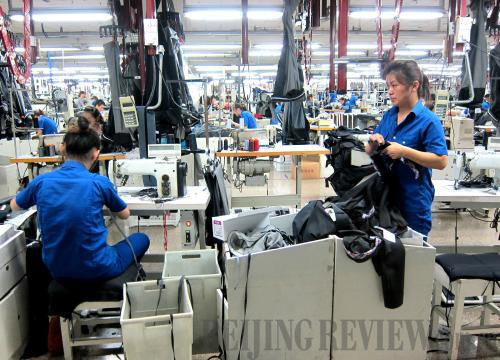|
 |
|
ON DISPATCH: Migrant workers toil at a garment factory in Jiangyin, Jiangsu Province, on October 15, 2011. Many labor-intensive businesses use dispatched workers to slash costs (LI JIAN) |
A television reporter in Beijing known by his pseudonym Lu Li has produced quite a few feature stories on safeguarding workers' rights. He is producing a news report on a dispatched worker who was laid off after working for the same employer for more than two decades. The employer did not pay her severance, nor had it ever bought her any social insurance.
A labor dispatch or staff leasing arrangement is similar to a temp agency. The dispatch service provider hires workers and dispatches them to units with which it has negotiated labor agreements.
This employment model has been used in many industries to slash labor costs.
Indirect employment of dispatched workers can circumvent some obligations businesses would otherwise be required to fulfill in direct hiring, thus exploiting a regulatory loophole in the Labor Contract law, according to Lu.
Lu learned that many companies neglect paying social insurance tax for dispatched workers, although the government mandates employers of regular workers to pay five kinds of insurance including endowment, health, unemployment, occupational injury and maternity insurances, as well as a fund for low-interest housing loans. These non-wage benefits altogether represent about 40 percent of labor costs for some organizations, he said.
Worksite employers are not required to sign employment contracts with dispatched workers, so they lack job security and can be fired without good reason. Nor can they enjoy the same training, promotion and honors as regular staff, Lu said, hence they do not have a sense of belonging.
In an eastern province, the average wages of dispatched workers in such industries as telecommunications, electricity and banking are reportedly only 38 percent that of regular staff.
"Generally speaking, the phenomenon of unequal pay for equal work is quite prevalent," Lu said.
Unequal pay for equal work resulting from dispatch labor abuse, like the unequal value for identical lives in personal injury insurance indemnity, deeply undermines the basic rules of market economy and social justice, said Zheng Gongcheng, a Standing Committee member of the National People's Congress (NPC), the national legislature.
"The persistence of unequal pay for equal work poses greater social risks. The abuse of labor dispatch runs against the original purpose of the Labor Contract Law and seriously undermines its legal effectiveness," said Zheng, also a professor at the Social Security Research Center of the Beijing-based Renmin University of China.
China's first Labor Contract Law, which became effective on January 1, 2008, aims to protect the legitimate rights and interests of workers. Lu is a beneficiary of the law. Before becoming a TV reporter, he was dispatched to work abroad and earned only one fourth what the worksite employer had paid the employment agency.
This violates the Labor Contract Law, which stipulates that staffing firms may not pocket part of the labor compensation that the worksite employers pay to dispatched workers in accordance with the placement agreement. Lu reported his staffing agency to a supervising government department, and obtained the payment he was due.
"The Labor Contract Law plays an important role in developing a harmonious employment relationship and maintaining social stability," said Liu Jichen, Director of the Department of Legal Affairs of the All-China Federation of Trade Unions. He said that ambiguities in dispatch labor agreements render the system vulnerable to abuse.
A 2010 survey on dispatch labor conducted by the All-China Federation of Trade Unions showed that there are 60 million dispatched workers in China, accounting for nearly 20 percent of the country's workforce.
"Unchecked expansion of dispatch labor will not only directly hurt workers' legitimate rights, but also undermine the labor contract system and employment relations as well as social stability," said Zhou Xiaozheng, a professor at the Legal Sociology Research Institute of the Renmin University of China.
On December 28, 2012, the 11th NPC Standing Committee adopted an amendment to the Labor Contract Law after two readings. The amendment aims at strictly regulating dispatch labor to protect the rights and interests of dispatched workers. The amended law went into force on July 1.
| 